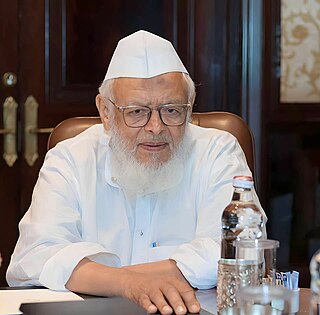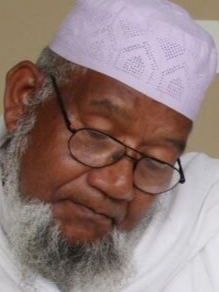
The Deobandi movement or Deobandism is a revivalist movement within Sunni Islam that adheres to the Hanafi school of law. It was formed in the late 19th century around the Darul Uloom Madrassa in Deoband, India, from which the name derives, by Muhammad Qasim Nanautavi, Rashid Ahmad Gangohi, Ashraf Ali Thanwi and Khalil Ahmad Saharanpuri after the Indian Rebellion of 1857–58. They opposed the influence of non-Muslim cultures on the Muslims living in South Asia. The movement pioneered education in religious sciences through the Dars-i-Nizami associated with the Lucknow-based ulama of Firangi Mahal with the goal of preserving traditional Islamic teachings from the influx of modernist and secular ideas during British colonial rule. The Deobandi movement's Indian clerical wing, Jamiat Ulema-e-Hind, was founded in 1919 and played a major role in the Indian independence movement through its participation in the Pan-Islamist Khilafat movement and propagation of the doctrine of composite nationalism.

The Darul Uloom Deoband is an Islamic seminary in India at which the Sunni Deobandi Islamic movement began. Uttar Pradesh-based Darul Uloom is one of the most important Islamic seminaries in India and the largest in the world. It is located in Deoband, a town in Saharanpur district, Uttar Pradesh. The seminary was established by Muhammad Qasim Nanautavi, Fazlur Rahman Usmani, Sayyid Muhammad Abid and others in 1866. Mahmud Deobandi was the first teacher and Mahmud Hasan Deobandi was the first student.

South Africa is a Christian majority nation with Islam being a minority religion, practised by roughly 1.6% of the total population. Islam in South Africa has grown in three different phases. The first phase brought the earliest Muslims as part of the involuntary migration of slaves, artisans, political prisoners, and political exiles from the Dutch East Indies to the Cape Colony from 1652 to 1800. The second phase was the arrival of indentured labourers from British India to work in the sugar-cane fields in Natal from 1860 to 1911. Of the approximately 176,000 Indians of all faiths who were transported to the Natal province, almost 7–10% of the first shipment were Muslims.
Fazl-e-Haq Khairabadi was a Hanafi mufti, Kalam scholar, Maturidi theologian, and poet. He was an activist of the Indian independence movement and campaigned against British colonialism. He issued an early religious edict in favour of doing military jihad against British colonialism during 1857 and inspired various others to participate in the 1857 rebellion. He wrote Tahqeeq al-Fatwa Fi Abtal al-Taghwa in refutation of Ismail Dehlvi's Taqwiyat al-Iman and authored books such as al-Thawra al-Hindiyya.
Ml Cassim Mohammed Sema was a South African Sunni Muslim scholar who established the first madrasa in South Africa and possibly the first madrasa that uses English as its medium of instruction. He was the founder of Darul Uloom Newcastle.

Abadin Tadia Tjoessoep, more commonly known as Sheikh Yusuf or Sheik Joseph, was an Indonesian Muslim of noble Makassar descent. He was also known as Muhammad Yusuf al-Maqassari or Tuanta Salamaka ri Gowa. In 1693 he was exiled to the Cape of Good Hope, South Africa, which resulted in his establishing Islam in the Cape.

The Auwal Mosque, alternatively spelled Awwal, Owal or Owwal, is a mosque in the Bo-Kaap neighbourhood of Cape Town, South Africa. It was completed in 1794 and was the first mosque established in South Africa.

Arshad Madani is an Indian Islamic scholar and the current Principal of Darul Uloom Deoband. He succeeded Asad Madni as the eighth president of the Jamiat Ulama-e-Hind. The organization split around 2008, and Madani continues to serve as the president of its Arshad faction.

Yusuf Karaan was a South African Sunni Muslim scholar from Strand who served as head mufti of Muslim Judicial Council.
The Halal pork scandal of South Africa was a scandal that broke out in South Africa in 2011 where a leading meat importer labelled pork as halal. The importer was also accused of relabelling kangaroo meat from Australia and water buffalo meat from India as halal even though South Africa's halal certification authority, the Muslim Judicial Council (MJC) had not approved these. The accused company, Cape Town based importer, Orion Cold Storage said it was the victim of a smear campaign by its rival businesses. The MJC suspended its dealings with Orion Cold Storage and the accusing Muslim companies obtained a court order banning Orion from using the halal label. The South African Halaal Authority Trust, the Red Meat Industry Forum of South Africa and the South African Meat Industry Company filed an interdict application against Orion, to stop the company from distributing meat.

Taha Karaan was a South African Muslim scholar and jurist. He was the head-mufti of the Muslim Judicial Council, South Africa. He was the founder of Mahajjah Research Institute and the Dar al-Uloom al-Arabiyyah al-Islamiyyah in Strand.

Revival from Below: The Deoband Movement and Global Islam is a book by Brannon D. Ingram, a professor affiliated with Northwestern University. This scholarly publication, brought to readers in 2018 through the University of California Press, explores the reformist agenda of the Deobandis and delves into the understudied aspect of their expansion beyond South Asia, with a particular focus on South Africa. The author reexamines the Deobandis' articulation of their reformist goals, unveiling a dimension that has received inadequate scholarly attention: their networks' reach and influence in regions outside of South Asia. The author offers compelling insights into the meaning of the Deobandi tradition and delves into the Deobandis' understanding of religious and social reform. Through a balanced approach encompassing both textual sources and individual agency, Ingram elucidates the intricate dynamics of Deobandi practices and analyzes the implications of their transnational expansion in the post-colonial era. Despite its paramount significance, the Deobandi stream of thought within Hanafi Islam is often subject to misinterpretation and unwarranted criticism. In reality, it stands as an influential Muslim reform and revival movement, surpassing all others outside of the Middle East.

This bibliography of Deobandi Movement is a selected list of generally available scholarly resources related to Deobandi Movement, a revivalist movement within Sunni Islam, adhering to the Hanafi school of law, formed in the late 19th century around the Darul Uloom Deoband in British India, from which the name derives, by Qasim Nanawtawi, Rashid Ahmad Gangohi and several others, after the Indian Rebellion of 1857–58. It is one of the most influential reform movements in modern Islam. Islamic Revival in British India by Barbara D. Metcalf was the first major monograph specifically devoted to the institutional and intellectual history of this movement. Muhammad Tayyib Qasmi wrote a book named The Tradition of the Scholars of Deoband: Maslak Ulama-i-Deoband, a primary source on the contours of Deobandi ideology. In this work, he tried to project Deoband as an ideology of moderation that is a composite of various knowledge traditions in Islam. This list will include Books and theses written on Deobandi Movement and articles published about this movement in various journals, newspapers, encyclopedias, seminars, websites etc. in APA style. Only bibliography related to Deobandi Movement will be included here, for Darul Uloom Deoband, see Bibliography of Darul Uloom Deoband.

This bibliography of Darul Uloom Deoband is a selected list of generally available scholarly resources related to Darul Uloom Deoband, a leading Islamic seminary and Muslim theological centre in India at which the Deobandi movement began, founded in 1866. It is one of the most influential reform movements in modern Islam. It created a largest network of satellite madrasas all over the world especially India, Bangladesh, Pakistan, Afghanistan neighboring countries in Asia and beyond, and as far afield as the Caribbean, South Africa, United Kingdom and the United States. Islamic Revival in British India by Barbara D. Metcalf was the first major monograph specifically devoted to the institutional and intellectual history of Deoband. Syed Mehboob Rizwi wrote History of Darul Uloom Deoband in 1977 in 2 volumes. This list will include Books and theses written on Darul Uloom Deoband and articles published about Deoband in various journals, newspapers, encyclopedias, seminars, websites etc. in APA style. Only bibliography related to Darul Uloom Deoband will be included here, for Deobandi movement, see Bibliography of Deobandi Movement.
Darul Uloom Newcastle is a college for Higher Islamic Education, located in Newcastle, KwaZulu-Natal, South Africa. It was the first formal institution of higher Islamic studies in South Africa, as well as the first Deobandi madrasa in South Africa. It was founded by Cassim Sema in 1973. It is called the mother of all Darul Ulooms in South Africa. Although only Hanafi fiqh is taught in such institutions in the Indian subcontinent, it also offers Hanafi, Shafi'i fiqh and Maaliki Fiqh.

Darul Uloom Deoband was established in 1866 in the Saharanpur district of Uttar Pradesh, India, as part of the anti-British movement. It gave rise to a traditional conservative Sunni movement known as the Deobandi movement. The Deobandi Movement has an international presence today, with its full-fledged manifestation in South Africa, a country where the movement was initiated through the Indian Gujarati merchant class. The Islamic education system of the Deobandi movement, as well as the necessary components of social and political organizations such as Tablighi Jamaat, Sufism and Jamiat, are fully functioning effectively in South Africa, as they do in India. Madrasas in South Africa provide Islamic higher education and are now centers for Islamic education for foreigners who are interested in receiving a Deobandi-style education. Many of their graduates, especially from Western countries such as the United Kingdom and the United States, are Western students. Some of South African madrasas are recognized globally, providing fatwa services. South Africa is now known for producing exceptional Islamic literature through translation and compilation. Similarly, the Tabligh Jamaat is a hub in South Africa that spreads throughout South and East Africa. Graduates of South African madrassas spend their time in the path of the Tabligh Jamaat. Through the work of several spiritual personalities of the Deobandis, the tradition of Deoband's Tasawwuf (Sufism) has taken root in South Africa. Among them are Zakariyya Kandhlawi, Masihullah Khan, Mahmood Hasan Gangohi and Asad Madani. South African Deobandi Muslims have many important and influential educational and socio-political organizations that educate the people and play an important role in religious and social activities. Among them are Jamiatul Ulama South Africa and the Muslim Judicial Council.

Gassan Solomon was a South African politician and Muslim religious leader in Cape Town. He represented the African National Congress (ANC) in the National Assembly from 1994 to 2009.











